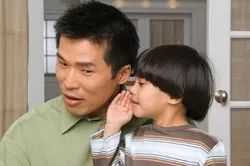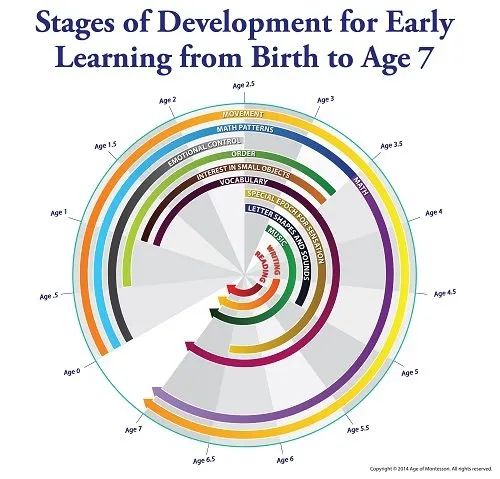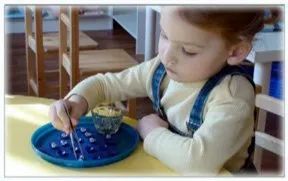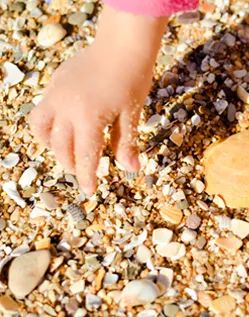The Ten Secrets of Montessori - #4 Sensitive Periods
A sensitive period is a burning fire of interest in something, during the period of time that a child acquires a new specific skill. -Mary Ellen Maunz
Ten Secrets of Montessori

Maria Montessori uncovered secrets--ten to be exact. Lucky for us, Mary Ellen Maunz, M. Ed., founder and Program Director of Age of Montessori, is willing to share the treasure of information within these secrets, and to explain exactly what they can mean to you and your children. With these ten secrets, you will gain a rich understanding of the framework beneath the Montessori Method. Maria Montessori developed more than a revolutionary educational method; she discovered the true inner workings of the child’s mind. These ten secrets are based on her lifetime of observing children and recognizing what they really need to thrive.
Secret #4: Sensitive Periods
Through her years of study and observation, Maria Montessori discovered what she called “sensitive periods.” Sensitive periods are developmental windows of opportunity during which the child can learn specific concepts more easily and naturally than at any other time in their lives. A child in the midst of a sensitive period will show an especially strong interest or inclination toward certain activities or lessons.
 "At such a time everything is easy; all is life and enthusiasm."
"At such a time everything is easy; all is life and enthusiasm."

"It is this sensibility which enables a child to come into contact with the external world in a particularly intense manner. Every effort marks an increase in power." - Maria Montessori
This is a big reason why the Montessori method is based on “child-led” learning. To allow children to follow their interests and instincts is to maximize the power of these sensitive periods. Conversely, if the opportunity of the sensitive periods is missed, it can never again be recaptured. Fortunately, we do know when certain sensitive periods are likely, thanks to the wisdom of Maria Montessori. Knowing what to expect and when, allows us (parents, teachers, grandparents, and caregivers) to anticipate and provide the necessary environment to fulfill the child’s needs.
"I observed little children; I sensed their needs; I tried to fulfill them; they call that the Montessori Method." - Maria Montessori
Maria Montessori recognized and categorized eleven basic sensitive periods of development:

- Movement
- Math patterns
- Emotional control
- Order
- Interest in small objects
- Vocabulary
- Sensations
- Letter shapes and sounds
- Music
- Writing
- Reading
Movement: Children are born with limited control of movement, but gain rapidly in areas of both gross and fine motor control. As they learn to use their bodies, children are also developing cognitive abilities.
The hands are the instruments of man’s intelligence. ~ Maria Montessori
Math Patterns: Incredible as it may seem, babies are born with mathematical minds. Montessori discovered that babies come into this world naturally hardwired to learn mathematics.
Emotional Control: Babies learn about relationships, communication, and emotional control from the moment they are born.
Need for Order: Very young children (6 months to 3 years) have an innate need for order. It is a deep psychological need. Many parents don’t realize it is there, and with good reason. Certainly most of us parents have watched our little ones behaving in ways that seem anything but orderly. But Montessorians have proven, again and again, that once the standard is set, the child’s internal desire for order is activated. Also, some of the unruly tantrums we witness are actually the result of the child’s sense of order being disrupted.
 Children between one and four are experiencing a sensitive period for small objects. This will ultimately lead to the development of fine motor control and the pincer grasp: fundamentals for writing.
Children between one and four are experiencing a sensitive period for small objects. This will ultimately lead to the development of fine motor control and the pincer grasp: fundamentals for writing.

Interest in Small Objects: Children between one and four years old are experiencing an intense sensitive period for small objects. This interest will ultimately lead to the development of fine motor control and the pincer grasp. These are fundamentals for writing and many other important skills.
Vocabulary: Children come into this world hard-wired for learning language. This inborn tendency makes the acquisition of language especially easy for children under six years old.
"To talk is in the nature of man." - Maria Montessori
Special Epoch for Sensation: Children learn more easily and effectively through hands-on, physical sensation than by just watching or listening to a lesson. This is due to the sensitive period Montessori called the “special epoch for sensation.”
Letter shapes and sounds. Children also become very sensitive to and interested in letter shapes and sounds. Between the ages of two and a half and five years, children are drawn to activities such as tracing textured (sandpaper) letters with their fingers and correlating the sound of the letter with its shape.
The Letters are a stimulus, which illustrate the spoken language already in the mind of the child. ~Maria Montessori
Music: Around age three, children experience a sensitive period for learning rhythm, pitch, melody, and more. Music develops the brain, leading to academic, social, and emotional growth.
Writing and Reading: Early literacy development is about the preparation of the child’s mind. Young children are open to the right information at the right time. When children are given lessons, materials, and activities as they are ready for them, learning to read is a natural, continuous progression. This is one of the advantages of the Montessori Method. In the Montessori prepared environment, children choose from appropriate materials based on their own interests and readiness.
Would you like to learn more about the child’s sensitive periods of development? Join us for Age of Montessori’s 2-week online, interactive course: Discovering the Child's Sensitive Periods. This short course is great for parents and teachers alike!
______________________________________________





















